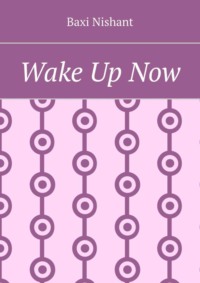Kitabı oku: «Wake Up Now»
© Baxi Nishant, 2019
ISBN 978-5-0050-4333-7
Created with Ridero smart publishing system
Wake Up Now
NISHANT BAXI
Table Of Contents
Foreword
Chapter 1:
Introduction
Chapter 2:
Sleep Deeper, Wake Better
Chapter 3:
Sleep That We Need
Chapter 4:
Insomniac’s Deal
Chapter 5:
Energy Boosts from Short Exercises
Chapter 6:Boost energy with Healthy DietChapter 7:Set your mind’s alarm clock
Chapter 8:
Practice meditation before sleep and after wake up
Chapter 9:Managing stress the smarter way
Wrapping Up
Foreword
Sleep is a constantly recurring event characterized by reduced or absent consciousness. A state of relatively reduced sensory activity, Sleep is believed to be as important as being awake. It is the time where both the body and the mind recuperate from all the stress it has experienced throughout the day. Get all the info you need here.
Chapter 1:
Introduction
Synopsis
In sleep, all the voluntary muscles remain inactive and involuntary muscles functions are reduced. In other words, it is like switching off a machine or placing it in idle mode to allow the machines to cool off and prevent damage. It is mostly done at night where hormone levels are at the lowest.
How Sleep Works
A person’s sleep can be affected by a lot of factors one of these factors include the circadian rhythm. The sleep-wake homeostasis or the circadian clock controls the sleep timing. It may have the greatest significance and greatest effect on the sleep of an individual. Sleep timing means the time you sleep and the time you wake up.
The circadian clock is also an inner time keeper, temperature controller, and an enzyme regulator. It is the rhythm that determines the ideal time for a person’s restorative sleep and rest. It works together with a neurotransmitter called Adenosine.
Adenosine is a neurotransmitter responsible for inhibiting bodily processes involving wakefulness. Our circadian rhythm is commonly affected by poor sleeping habits such as overnight shifts, shifting time zones like flying from one country to another,
When a person goes to bed to rest, he or she undergoes a bodily and organized process called sleep. An individual passes through five phases of sleep: stages 1, 2, 3, 4, and REM (Rapid Eye Movement).
These stages progress into a cycle from stage 1 to REM. The cycle may be repeated more than twice in one night. An individual spends about 50% of his sleeping time in stage 2 of the cycle, 20% in REM and 30% is spent on the other part of the cycle. Infants on the other hand have different percentages wherein they spend about half of their sleeping time in REM.
Stage 1 is the stage in between sleep and wakefulness. A person’s sleep would be easily disrupted if the person is in this stage. Muscle activity is still constant and the eye movements are still observed.
For the stage 2, the person’s sleep gradually deepens. It is harder to wake a person in this stage of sleep.
On stages 3 and 4, a person no longer responds to environmental stimuli, Stimuli includes loud noises and bright lights. It is the stage where the person stays before progressing to REM.
REM or Rapid Eye movement is part of the sleeping stage which a person enters approximately 90 minutes after sleep is initiated. The deepest stage in the sleep cycle and is the hardest time to wake up a person.
Muscle activity is greatly reduced but the brain activity is noticeably highest. EEG tests confirm that a person’s brain activity during the REM stage is similar to that when a person is awake.
Chapter 2:
Sleep Deeper, Wake Better
Synopsis
Still tossing around in bed even though you turned in a couple of hours ago? Do you feel uncomfortable and something keeps on bothering you every time you close your eyes? It may be that your circadian rhythm has been disrupted or certain factors have been affecting your sleep time.
There are different ways for a person to be able to sleep comfortably and wake up refreshed the next day. According to the National Sleep Foundation, you have a better chance of sleeping better and deeper when you follow the following:
Schedule, Exercise, Stimulant avoidance, relaxing before sleep, sleeping until sunlight, don’t lie in bed, room temperature control, and consultation.
Ücretsiz ön izlemeyi tamamladınız.
